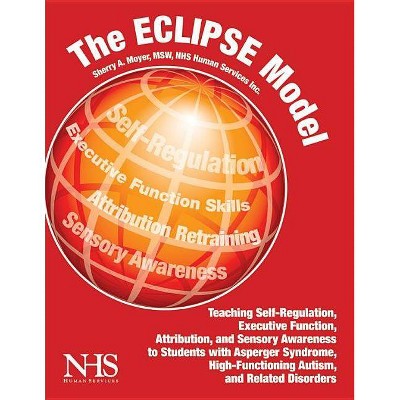The Eclipse Model - by Sherry Moyer (Paperback)

Similar Products
Products of same category from the store
AllProduct info
<p/><br></br><p><b> About the Book </b></p></br></br>The ECLIPSE Model targets the skills needed to improve social competence, such as executive functioning, theory of mind, causal attribution, processing speed, and working memory. The ECLIPSE MODEL directly addresses four challenge areas that are not typically covered by other curricula.<p/><br></br><p><b> Book Synopsis </b></p></br></br><p><em>The ECLIPSE Model</em> targets the skills needed to improve social competence, such as executive functioning, theory of mind, causal attribution, processing speed, and working memory. Without effective use of these skills on a regular basis, development of other areas of functioning academic, adaptive, social and vocational skills will be inhibited. <em>The ECLIPSE Model</em> directly addresses four challenge areas that are not typically covered by other curricula: self-regulation, executive function, attribution retraining, and sensory awareness. These four areas impact almost all activities across environments, and individuals without adequate skills in these areas are unlikely to reach their full potential. The curriculum provides step-by-step lessons for teaching these vital skills in a way that will motivate young people.</p><p/><br></br><p><b> Review Quotes </b></p></br></br><br><p> </p><p>One of the biggest challenges NHS Human Services faced was finding a curriculum for our students with Asperger Syndrome and PDD-NOS. The ECLIPSE Model transforms the latest research into a user-friendly philosophy and lesson plans for teaching vital global skills like self-regulation and causal attribution. Easy to read and implement, The ECLIPSE Model has provided the NHS Human Services staff with everything needed to accommodate and support the diverse needs of our students. It is truly a significant advancement in systematic programming for the autism community! --Karen Markle, NHS vice president for Autism Services</p><p> </p><p>The ECLIPSE Model is a unique, commonsense approach to teaching real-life, everyday skills designed to improve the social and behavioral functioning of learners with Asperger Syndrome and related disorders. The model helps to reframe the development of individual goals into specific skills that will make a measurable and meaningful long-term difference. This book is a thoughtful contribution that parents and professionals should consider essential to their programming! --Peter F. Gerhardt, Ed.D., president and chair, Scientific Council, Organization for Autism Research</p><p> </p><p>The ECLIPSE Model is of incredible importance for teaching individuals on the autism spectrum APPROPRIATELY and SUCCESSFULLY! This book marks a seminal point in education if I could, I would send a copy to every special education director in the country. Never have I learned so many important tips, procedures, and concepts so easily. --Susan J. Moreno, president, MAAP Services for Autism and Asperger Syndrome</p><p> </p><p>One of the biggest challenges NHS Human Services faced was finding a curriculum for our students with Asperger Syndrome and PDD-NOS. The ECLIPSE Model transforms the latest research into a user-friendly philosophy and lesson plans for teaching vital global skills like self-regulation and causal attribution. Easy to read and implement, The ECLIPSE Model has provided the NHS Human Services staff with everything needed to accommodate and support the diverse needs of our students. It is truly a significant advancement in systematic programming for the autism community! --Karen Markle, NHS vice president for Autism Services</p><br>
Price History
Price Archive shows prices from various stores, lets you see history and find the cheapest. There is no actual sale on the website. For all support, inquiry and suggestion messagescommunication@pricearchive.us




















